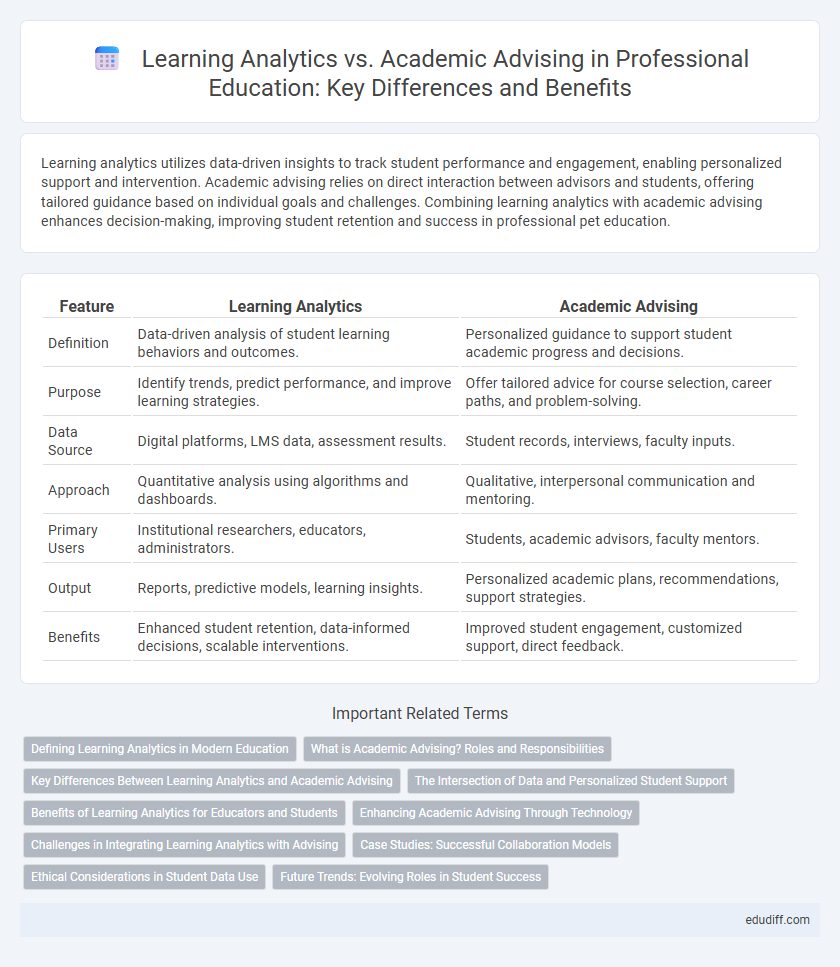Learning analytics utilizes data-driven insights to track student performance and engagement, enabling personalized support and intervention. Academic advising relies on direct interaction between advisors and students, offering tailored guidance based on individual goals and challenges. Combining learning analytics with academic advising enhances decision-making, improving student retention and success in professional pet education.
Table of Comparison
| Feature | Learning Analytics | Academic Advising |
|---|---|---|
| Definition | Data-driven analysis of student learning behaviors and outcomes. | Personalized guidance to support student academic progress and decisions. |
| Purpose | Identify trends, predict performance, and improve learning strategies. | Offer tailored advice for course selection, career paths, and problem-solving. |
| Data Source | Digital platforms, LMS data, assessment results. | Student records, interviews, faculty inputs. |
| Approach | Quantitative analysis using algorithms and dashboards. | Qualitative, interpersonal communication and mentoring. |
| Primary Users | Institutional researchers, educators, administrators. | Students, academic advisors, faculty mentors. |
| Output | Reports, predictive models, learning insights. | Personalized academic plans, recommendations, support strategies. |
| Benefits | Enhanced student retention, data-informed decisions, scalable interventions. | Improved student engagement, customized support, direct feedback. |
Defining Learning Analytics in Modern Education
Learning analytics in modern education involves the systematic collection, measurement, and analysis of student data to enhance learning outcomes and institutional effectiveness. This data-driven approach enables educators to identify patterns, predict student performance, and tailor interventions to individual learner needs. By integrating learning analytics with academic advising, institutions optimize personalized support and improve student retention and success rates.
What is Academic Advising? Roles and Responsibilities
Academic advising involves personalized guidance aimed at supporting student success, academic progress, and career planning through one-on-one interactions between advisors and students. Advisors play critical roles in course selection, degree planning, and identifying resources to enhance student retention and achievement. This personalized approach complements learning analytics by addressing individual student needs that data alone may not capture.
Key Differences Between Learning Analytics and Academic Advising
Learning analytics leverages data-driven insights from student behaviors and academic performance to identify patterns, predict outcomes, and personalize learning experiences. Academic advising emphasizes direct, personalized guidance through one-on-one interactions to support students' academic planning and decision-making. While learning analytics provides scalable, evidence-based recommendations, academic advising focuses on holistic, interpersonal support tailored to individual student goals and challenges.
The Intersection of Data and Personalized Student Support
Learning analytics harnesses data from multiple educational touchpoints to identify patterns in student performance, enabling academic advisors to tailor interventions more effectively. By integrating real-time analytics with traditional advising practices, institutions can offer personalized support that addresses individual learning needs and predicts potential challenges. This intersection of data-driven insights and personalized guidance enhances student success outcomes and retention rates.
Benefits of Learning Analytics for Educators and Students
Learning analytics provides educators with real-time data on student performance, enabling personalized instruction and timely intervention. Students benefit from tailored feedback and adaptive learning paths that enhance engagement and optimize academic success. This data-driven approach improves retention rates and supports evidence-based decision-making in educational institutions.
Enhancing Academic Advising Through Technology
Learning analytics leverages data-driven insights to personalize academic advising, enabling advisors to identify at-risk students and tailor interventions effectively. Integrating advanced analytics platforms facilitates real-time monitoring of student performance, course engagement, and progression patterns. This technological enhancement optimizes advising strategies, improves retention rates, and supports informed decision-making in higher education institutions.
Challenges in Integrating Learning Analytics with Advising
Integrating learning analytics with academic advising presents challenges such as data privacy concerns, the complexity of interpreting analytics for personalized guidance, and the need for effective collaboration between data scientists and advisors. Limited technological infrastructure and varying levels of advisor digital literacy further complicate the implementation process. Addressing these barriers requires robust data governance, tailored training programs, and seamless communication between analytical teams and advising staff.
Case Studies: Successful Collaboration Models
Case studies showcase successful collaboration models between learning analytics and academic advising, emphasizing data-driven decision-making to enhance student outcomes. Institutions leveraging predictive analytics integrate real-time data insights with personalized advising strategies to improve retention and graduation rates. This synergy fosters targeted interventions, optimizing resource allocation while promoting student engagement and academic success.
Ethical Considerations in Student Data Use
Learning analytics involves the collection and analysis of student data to improve educational outcomes, raising ethical concerns related to privacy, consent, and data security. Academic advising relies on this data but must balance personalized support with maintaining student confidentiality and avoiding bias. Institutions must develop clear policies to ensure transparent data use, protect student rights, and foster trust in educational environments.
Future Trends: Evolving Roles in Student Success
Learning analytics is transforming academic advising by providing data-driven insights that enable personalized support and proactive interventions, enhancing student success outcomes. The integration of artificial intelligence and machine learning in learning analytics allows advisors to anticipate student challenges and tailor guidance effectively. Future trends emphasize a collaborative ecosystem where learning analytics tools complement human advisors, optimizing decision-making and fostering continuous improvement in educational strategies.
Learning Analytics vs Academic Advising Infographic

 edudiff.com
edudiff.com